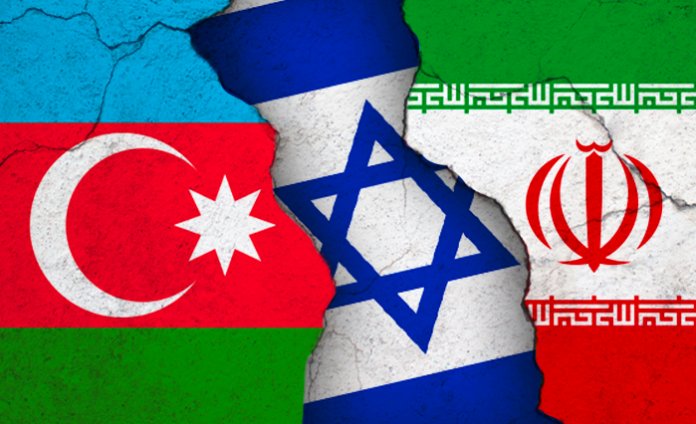On November 10, 2020, with the tripartite declaration jointly signed by the leaders of Azerbaijan, Armenia and Russia, the 44-day-long Second Karabakh war ended and Azerbaijan achieved victory. Of course, Azerbaijan’s victory in the Second Karabakh War was considered undesirable for a number of countries, including neighboring Iran. According to the clauses of the tripartite declaration declaring the end of the Second Karabakh war, Armenia had to give Azerbaijan a land route with Nakhchivan, which was called the Zangezur Corridor by the President of Azerbaijan. Since the beginning of the issue of the Zangezur Corridor, a number of countries in the region, more specifically Iran, began to be seriously concerned and even opposed the opening of this corridor. Of course, in the early days, the Iranian side expressed their opposition to the opening of the Zangezur Corridor, but over time, their rhetoric began to change, and even hardened. As a first step, the Ambassador of Iran to Armenia, Abbas Badakhshan Zohuri, and the military attaché of the embassy, Colonel Bahman Sadegin, visited Gegharkunik province of Armenia, located on the Armenia-Azerbaijani border. Although Zohuri made a statement during this visit and called on the parties to exercise restraint, on November 22, 2022, during his meeting with the Prosecutor General of Armenia, Anna Vardapetyan, he said, “The 3,000-year-old historical and cultural relations between Armenia and Iran are a good basis for the development of relations in all directions, and this can be observed especially in recent years.” by using the phrase, he clearly stated the position of Iran. It is known to everyone that the main reasons behind the former ambassador of Iran to Armenia making such statements were calculated to hinder the implementation of the November 10 tripartite declaration by Armenia and to prevent the opening of the Zangezur corridor, which will connect Azerbaijan and Nakhchivan. We cannot say that the main goal of Iran is to ensure the territorial integrity of Armenia. Analyzing both the current situation of Iran and the current situation in the region and the world, it is clear that the main goal is not to be left out of the economic projects that are supposed to pass through the region and to avoid the economic sanctions that have been going on for many years.
In that meeting, Zohuri went a little further and said that “Sünik (Zangazur-ed.) region plays an important role for Tehran”. From this, it can be concluded that the Tehran regime is trying to use all possible opportunities in the Zangezur Corridor issue, one of which was the urgent opening of the Iranian consulate in the Gafan region of Armenia in October 2022. Undoubtedly, this step taken by Iran damaged the already damaged relations with Azerbaijan a little more. The Iranian side came to the fore when it opened a consulate in Gafan, and also when it gave free weapons to Armenia. Thus, in October 2022, Iran will give Armenia 500 Dehlaviyeh and 100 Almas anti-tank guided missile (TAIR) complexes and give a part of these missile complexes to the Armenian separatist forces in the Karabakh region of Azerbaijan. It was met with serious protest by Azerbaijan and was warned about it through diplomatic channels.
On November 18, 2022, along with Kenya and Albania, Azerbaijan decided to open an embassy in Israel and a representative office in Palestine. After this decision made by the Azerbaijani Milli Majlis, Yair Lapid, who was the Prime Minister of Israel at that time, shared on Twitter that “Azerbaijan is an important partner of Israel and is the homeland of one of the largest Jewish communities in the Muslim world.” Of course, this event was met with serious protest by Iran, and even the Tehran regime began to accuse Azerbaijan of collaborating with Zionism and bringing Israel to its neighborhood. The Tehran regime intensified the issue to such an extent that the media organizations affiliated to the SEPAH, which had already become the main voice in Iran, began to issue threats against Azerbaijan. Of course, Iran’s inadequate behavior in relation to the processes ultimately led to further aggravation of relations. As a result of what has been said, the Tehran regime has taken the next step that will affect the diplomatic relations between the parties before the tension between Iran and Azerbaijan is resolved. On January 27, 2023, the head of the embassy’s security service was martyred and another employee of the security service was injured as a result of the terrorist attack on the embassy of Azerbaijan in Tehran organized by the Iranian Special Service. Immediately after this terrorist incident, the Azerbaijani government decided to continue the activities of the consulate in Tabriz and to close our embassy in Tehran indefinitely, based on the fact that security was not sufficiently ensured. It should also be noted that at the same time as the terrorist attack against the Azerbaijani Embassy in Tehran on January 27, a terrorist attack was committed in Jerusalem (Jerusalem) by the representative of the groups affiliated with Iran, and as a result, 8 Israeli citizens died and 10 Israeli citizens were injured. Of course, Israel immediately retaliated, and as a result, airstrikes were carried out on both Iranian military bases in Syria and a number of military facilities on Iranian territory, including facilities located in 5 provinces, including Isfahan.
In my opinion, the fact that the terrorist attacks on the embassy of Azerbaijan in Tehran and in Jerusalem (Jerusalem) took place on the same day can certainly not be considered as a coincidence. When examining the event in more detail, it can be concluded that the Tehran regime intended to send a message to both Azerbaijan and Israel with these terrorist acts organized by Iranian special services. The terrorist attack against the Azerbaijani embassy in Tehran on January 27, 2023 sent a message to both Azerbaijan and the international community that any norms and principles of international law are not valid for Iran. That is, we not only do not guarantee the security of your diplomatic corps, we can even threaten it at any moment. Just as they did it against the diplomatic corps of the United States, Great Britain and Saudi Arabia in Iran. With the terrorist attack in Jerusalem (Quds), the message sent by the Tehran regime to Israel is that despite having nuclear weapons, I can commit a terrorist attack against you through the agency network connected to me. I believe that these are the main messages sent by Iran.
On March 28, 2023, an assassination attempt was organized against Fazil Mustafa, a member of the Azerbaijan Milli Majlis, based on the instructions of some circles in Iran. Undoubtedly, it is possible to note that the Tehran regime has a message to Azerbaijan and Israel behind this conspiracy. Because the opening of the Azerbaijani embassy in Israel took place one day after the assassination. It seems that Iran is resorting to such provocations in response to Azerbaijan’s opening of an embassy in Israel. The steps taken by Iran, which established diplomatic relations with Armenia since February 1992, are of course incomprehensible. Unlike Iran-Armenia relations, Azerbaijan-Israel relations are not directed against third countries or states, but only aimed at developing bilateral relations. Unlike Azerbaijan, Iran regularly tries to destabilize neighboring countries, including Azerbaijan, through its spy network. That is why, after the recent events, on April 6, 2023, 4 employees of the Iranian Embassy in Azerbaijan – Mirmahdi Mirsalampour Sharif, Gurbanali Purmarjan Warcovi, Hadi Moghadam and Asgar Bahari Khosh Manzar were accepted by the government of Azerbaijan in 1961 together with their family members. Declaring him a persona non grata and expelling him from the country within 48 hours on the grounds that he has committed actions that contradict the Vienna Convention on Diplomatic Relations and are incompatible with diplomatic status, the Tehran regime has seriously threatened both Azerbaijan and Israel It is of special importance for Azerbaijan and Israel in terms of organizing joint defense. At the “Jerusalem Day” rally organized by the Tehran regime on April 15, 2023, the raising of posters against Azerbaijan such as “The road to Jerusalem passes through Baku” and the sounding of provocations also indicate that the purpose here is to continue the provocation.
In the 44-day Second Karabakh War, the proper use of Azerbaijan’s products of the Israeli defense industry, especially drones and air defense systems, can be considered as one of the other important supports for achieving victory. From this point of view, it can be considered that the development of Azerbaijan-Israel relations is a priority for both countries in the current conditions. It should also be noted that the organization of mutual visits is of special importance for the development of bilateral relations. On April 19, 2023, the visit of a large-scale delegation to Azerbaijan led by the Minister of Foreign Affairs of Israel, Eli Cohen, can be noted as supporting the development of these relations. Looking at both the signed documents, press conferences and meetings, it is possible to note how fruitful the Israeli Foreign Minister Eli Cohen’s visit to Azerbaijan was. It is possible to note that Eli Cohen’s visit to Baku, which was received by Azerbaijan’s President Ilham Aliyev and Azerbaijan’s Foreign Minister Jeyhun Bayramov, is of great importance and serves the interests of both Israel and Azerbaijan.
If we take into account that the tension in Iran’s relations with Azerbaijan has reached its peak recently, then it was possible to say what the main topic of discussion was during this visit. But it is also worth noting that Israel’s Foreign Minister Eli Cohen, who made a statement before the visit, said that “Together with our friends in Baku, to deepen our cooperation in the fields of security, economy, innovation and energy, and especially to create a strong and united front against common challenges, I am today I am going on an important political trip.” It is clear from the statement and the negotiations that the parties are interested in deepening cooperation in security, economy, innovation and energy, as well as in the field of agriculture, in addition to the development of political relations.
When talking about cooperation in the field of security between Azerbaijan and Israel, the first thing we should mention should be the trade of military-defense products. Because since 2005, the military-technical field has started to come to the fore in bilateral relations. As a logical result of this cooperation, the military parade organized in Baku in 2008 began to display Israeli-made weapons and military equipment for the first time. In 2012, an agreement worth 1.6 billion US dollars was signed between Azerbaijan and Israel on the purchase of many defense products, including anti-aircraft and anti-missile systems. Of course, the development of cooperation between the parties in this field was one of the main goals. During the visit of the Prime Minister of Israel Benjamin Netanyahu to Azerbaijan in December 2016, a number of agreements were signed with President Ilham Aliyev to increase cooperation, one of the most important of which is the long-term purchase of $5 billion worth of weapons and military equipment by Azerbaijan from Israel. It was a contract that provided for the purchase. With this, the deepening of cooperation in the field of defense and security between Azerbaijan and Israel was accelerated. The purchase of “Zarbe”, “Harop”, “Heron” and “Hermes” kamikaze drones began to be realized based on this contract. These weapons, which Azerbaijan bought from Israel, were also used by the Azerbaijani army in the 4-day war between Armenia and Azerbaijan in April 2016. In addition, Israel supplies most of its oil demand from Azerbaijan. Based on the given statistical figures, it is possible to note that in 2022, the trade turnover between Azerbaijan and Israel reached 2 billion dollars, of which 1.5 billion dollars is the share of oil and oil products. This trend continues in other areas as well. Taking into account all this, it can be said that the strengthening of mutually beneficial cooperation is at the forefront of the main issues in Azerbaijan-Israel relations.
Immediately after Azerbaijan liberated its territories from the occupation in the Second Karabakh war, reconstruction and restoration works were started in the destroyed region, and in this process, Azerbaijan prefers cooperation with Israel. Azerbaijani companies are closely involved in the reconstruction and restoration works in Karabakh.
Conclusion
Of course, the analyzes conducted in the article and the presented facts reflect Azerbaijan-Israel and Azerbaijan-Iran relations not completely and in a certain period. From the evidence presented, it can be concluded that Iran’s position towards Azerbaijan is more hostile than neighborly or competitive. Although Iran tried to hide its position against Azerbaijan for a long time, it began to fully reveal its intentions after the Second Karabakh war. The steps taken by Iran for the development of Iran-Armenia relations not only in recent times, but also before the Second Karabakh war, during the Second Karabakh war and after it, are clearly visible. Iran is providing all the support it can to ensure that Armenia is not isolated and takes a stand against Azerbaijan. Of course, the main goal here is to bring Armenia into permanent war with Azerbaijan and to continue instability in the region.
Azerbaijan has not created conditions for any activity against Iran in its relations with Israel. Even though the relations between the parties have been tense recently, Azerbaijan still does not cooperate with any powers against Iran. Contrary to the expectations of some interested parties, it is possible to say that if there is any threat of war between Israel and Iran, it is not right to expect that Azerbaijan will allow its territory to be used against Iran. Due to the fact that there are up to 40 million Azerbaijani Turks in Iran, Azerbaijan is not interested in war in its neighboring country, and the possibility that any war that will take place will lead to long-term disasters is considered. The main goal of Azerbaijan is not to create tension with Iran, but to ensure its own security and the security of the region.
Undoubtedly, despite Iran’s protests, Azerbaijan will continue to develop relations with Israel in political, economic, security, cultural and other fields. I think there is enough potential for this. At the same time, the governments also have the will to develop these relations. If the parties both better assess the existing potential and develop the relationship, the results can be beneficial for both parties.
About Author:Samir Humbatov Head of the Center for International Relations and Diplomatic Studies in Baku,Azerbaijan.







